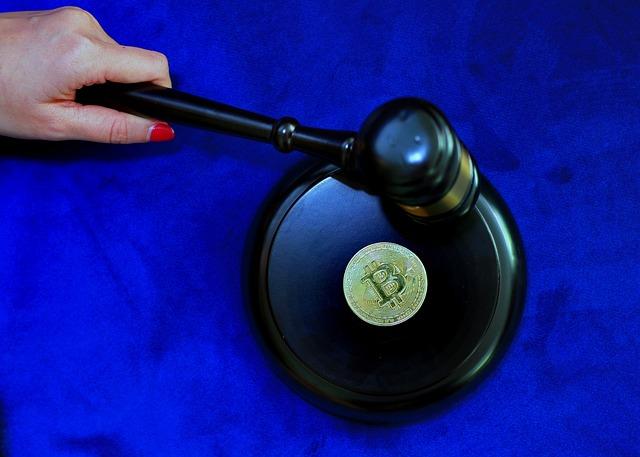Uruguay Passes Law Regulating Crypto,Could Set Precedent for Rest of Latin America
In a significant move that could reshape the landscape of cryptocurrency regulation across the region,Uruguay has enacted a extensive law aimed at providing clarity and oversight for digital assets.As Latin America grapples with the rise of cryptocurrencies, this landmark legislation positions Uruguay as a potential model for neighboring countries seeking to navigate the complexities of the crypto economy. The law introduces a regulatory framework focused on consumer protection, anti-money laundering, and promoting innovation, signaling a proactive approach to harness the benefits of blockchain technology while mitigating its risks. With experts suggesting that Uruguay’s progressive stance may inspire similar legislative efforts across Latin America, the implications of this growth could extend far beyond its borders, influencing the future of cryptocurrency in one of the most dynamic markets for digital finance.
Uruguay’s Groundbreaking Crypto Regulation: A Comprehensive Overview
In a significant move for the cryptocurrency landscape, Uruguay has officially enacted a comprehensive regulatory framework for digital assets, positioning itself as a pioneer in the region. This new law aims to create a structured and secure surroundings for crypto transactions, possibly influencing similar legislative efforts throughout Latin America.
Key components of the regulation include:
Licensing Requirements: All cryptocurrency service providers must obtain a license from the government to operate legally, ensuring a high standard of compliance.
consumer Protection Measures: The legislation emphasizes consumer safety, mandating transparency in transactions and minimizing risks associated with digital asset investments.
taxation Guidelines: Clear tax obligations for cryptocurrency entities will promote accountability and contribute to national revenues.
Anti-Money Laundering (AML) Protocols: The regulation integrates robust AML measures to curb illicit activities and enhance the integrity of the financial system.
Furthermore, the Uruguayan government plans to foster innovation by establishing a regulatory sandbox, allowing startups and emerging crypto projects to test their ideas in a controlled environment. This initiative is expected to stimulate growth in the fintech sector while concurrently ensuring compliance with the new law.
regulation Feature
Description
Licensing
Mandatory for all crypto service providers
Consumer Protections
Ensures transparency and safety for users
Tax Obligations
Clear guidelines for crypto taxation
AML Compliance
Stronger measures against money laundering
Regulatory Sandbox
Supports innovation through controlled testing

key Features of the new Law and Their Implications for Crypto Investors
Uruguay’s recent legislation represents a significant shift in the regulatory landscape for cryptocurrencies, aiming to provide clarity for investors and market participants. Among the key features of the law are:
Licensing Requirements: Cryptocurrency exchanges and related businesses must obtain licenses from regulatory authorities, ensuring a level of oversight and consumer protection.
Tax Regulations: Explicit guidelines on the taxation of cryptocurrency transactions have been established, helping investors navigate their fiscal responsibilities more effectively.
AML/KYC Requirements: New Anti-Money Laundering (AML) and No Your Customer (KYC) protocols must be enacted by all crypto service providers, increasing transparency in transactions.
Consumer Protections: Enhanced measures will be implemented to safeguard consumers against fraud and market manipulation, promoting trust in the crypto ecosystem.
the implications of these features are profound for crypto investors. Firstly, the licensing requirements will likely lead to greater legitimacy and professionalism within the market, attracting institutional investors who may have been hesitant before. Additionally, the clear taxation framework allows for better financial planning, fostering a culture of compliance rather than avoidance.
Moreover,with stringent AML and KYC protocols,there could be an improvement in the perceived safety of investments,potentially reducing the risk of illicit activities associated with cryptocurrencies.This legal backing can create a more secure environment for both novice and experienced investors, enhancing trust and participation in the market.
Feature
Implication for Investors
Licensing Requirements
Increased market legitimacy
Tax regulations
Improved financial planning
AML/KYC Requirements
Enhanced safety and transparency
Consumer Protections
Reduced fraud risk

How Uruguay’s Regulatory Framework Could Influence Regional Policy Making
Uruguay’s recent legislation to regulate cryptocurrency could serve as a pivotal model for neighboring nations grappling with similar challenges. By establishing a clear framework for crypto operations, Uruguay is positioning itself as a leader in the region, potentially setting benchmarks for governance, compliance, and innovation in digital finance.
The implications of this regulatory framework extend beyond mere compliance; they can influence economic stability and foster investor confidence. Key aspects that other countries might adopt include:
Taxation Policies: Establishing clear tax obligations for cryptocurrency transactions, which can help curb illicit activities.
Consumer Protection: Implementing measures to safeguard users against fraud and market volatility.
Licensing Requirements: Requiring adherence to established protocols for exchanges and wallet providers to ensure operational integrity.
Moreover, as regional discussions intensify over the digital economy, Uruguay’s proactive stance may encourage collaboration among Latin american countries to harmonize regulations. This can lead to:
Potential Outcomes
Benefits
Standardized Regulatory Practices
Streamlined compliance processes for businesses operating in multiple jurisdictions.
Cross-Border Transactions
Facilitation of smoother and more secure cross-border payments.
Regional Investment Growth
Attracting foreign investments as countries present unified stances on cryptocurrency.
Should these principles take root across Latin America,the region could emerge as a significant player in the global cryptocurrency landscape,promoting innovation while maintaining necessary oversight. As stakeholders observe Uruguay’s next steps, the ripple effects may lead to new collaborative frameworks that enhance economic resilience and digital sovereignty in the region.

Challenges Ahead: Implementation and Enforcement of the New Crypto Law
Implementing and enforcing the newly passed crypto law in Uruguay poses significant challenges for regulators and stakeholders alike. The law, aimed at establishing a clear framework for cryptocurrency operations, is seen as a pivotal move in a region where digital assets have largely been unregulated. However, with this progress comes the responsibility of ensuring compliance and effectively overseeing a rapidly evolving sector.
Key obstacles include:
Lack of expertise: Many regulatory bodies may not have the necessary expertise to oversee the complexities of crypto markets and technologies.
Resource constraints: Budget limitations could hinder the ability of government agencies to monitor and enforce new regulations consistently.
Public awareness: Raising awareness and understanding of the new law among crypto users and businesses is crucial for promoting compliance.
International collaboration: Crypto transactions frequently enough cross borders, making it essential for uruguay to work with international regulatory bodies and other nations for effective enforcement.
Moreover, a comprehensive approach to enforcement will necessitate robust technological infrastructure and ongoing education for both regulators and the public.The relationship between conventional financial institutions and the crypto ecosystem will also play a significant role in shaping the law’s success. Without adequate channels for cooperation, the law could face challenges in adaptation and compliance.
Key areas of Focus
Description
Regulatory Training
Develop training programs for regulators on cryptocurrency technology and market trends.
Public engagement
Host workshops and seminars to educate the public and businesses about compliance requirements.
Collaboration Efforts
Encourage partnerships between government, academia, and private sector for shared insights and resources.
As Uruguay steps into this uncharted territory, the response to these challenges will be closely watched by its neighbors in Latin America. The outcomes may very well serve as a benchmark for other nations contemplating similar regulatory frameworks in the burgeoning world of cryptocurrency.

Recommendations for Policymakers in Latin America: Learning from Uruguay’s Example
As latin America navigates the rapidly evolving landscape of cryptocurrency, Uruguay’s recent regulatory measures offer a valuable roadmap for other countries in the region.By fostering a progressive regulatory environment, policymakers can balance innovation with the necessary safeguards to protect consumers and stabilize markets. Here are several strategies that could be adopted:
Establish Clear Guidelines: Clear regulations outlining what constitutes legal cryptocurrency activities can mitigate uncertainty for businesses and consumers alike.
Encourage Public-Private Partnerships: Collaborations between government bodies and tech firms can lead to innovative solutions and a robust regulatory framework.
Implement Comprehensive Education Programs: Educating citizens about both the opportunities and risks associated with cryptocurrency is essential for fostering a knowledgeable consumer base.
Prioritize Cybersecurity Measures: Developing strict security standards can help safeguard financial systems against potential cyber threats that often accompany digital currencies.
Furthermore, policymakers should consider leveraging Uruguay’s experiences related to tax implications and identity verification procedures, as these are critical in fostering legitimacy in the crypto space.A comparative analysis may reveal how adopting similar practices can help streamline regulatory processes across countries in the region. The following table summarizes key considerations for policymakers based on Uruguay’s model:
Consideration
Uruguay’s Approach
Potential Benefits
Tax Regulation
Clear taxation guidelines for crypto transactions
Increased revenue for governments; more compliance
Consumer Protections
Mandatory disclosures and transparency requirements
Increased trust and participation in crypto markets
Enforcement Framework
Robust regulatory oversight to prevent fraud
Protection against scams, enhancing market credibility
By taking cues from Uruguay’s framework, other Latin American nations can not only regulate cryptocurrencies effectively but also leverage them as catalysts for economic growth and technological advancement. Emphasizing adaptability and foresight in legislative processes will be imperative to keeping pace with this dynamic sector.

Future Prospects: balancing Innovation with Regulation in the crypto Space
The recent passage of a comprehensive cryptocurrency regulation law in Uruguay marks a pivotal moment for the nation and possibly for the entire Latin American region.By establishing a framework that balances innovation and oversight, Uruguay is poised to lead by example, addressing the dual necessity of fostering technological advancement while safeguarding investors and the economy. This could encourage surrounding nations to follow suit, reflecting a broader acceptance of digital currencies across the continent.
As countries look to Uruguay’s regulatory model, several key aspects might shape their approach:
Consumer Protection: Ensuring that investors are informed and safeguarded against fraudulent schemes will be vital in building public trust.
innovation Incentives: Creating an environment that encourages startups and innovation without overbearing constraints will be crucial for the growth of the crypto sector.
Taxation Clarity: Clear tax guidelines will aid businesses and individuals in navigating the new landscape without fear of punitive measures.
Moreover, the regulatory framework can serve as a model for integrating cryptocurrency with traditional financial systems. By fostering collaboration between regulators, financial institutions, and tech companies, Uruguay could minimize risks associated with the volatile crypto market while enhancing its economic potential.
Regulatory Aspect
Potential Impact
Registration Requirements
Increases legitimacy of crypto businesses
AML and KYC Policies
Reduces incidence of fraud and money laundering
Licensing for Exchanges
Ensures compliance with financial standards
Public Awareness Campaigns
Educates consumers on risks and opportunities

In Conclusion
Uruguay’s recent legislation regulating cryptocurrencies marks a significant milestone not only for the nation but also for the broader Latin American landscape. By establishing a clear legal framework, the Uruguayan government aims to foster innovation while ensuring consumer protection and financial stability. As other countries in the region observe Uruguay’s approach, this legislation could serve as a blueprint for crypto regulation across Latin America, potentially setting the stage for a more harmonized regulatory environment. As the dialogue around digital assets evolves, stakeholders from both the public and private sectors will need to engage collaboratively to address the challenges and opportunities that lie ahead. The world will be watching closely as Uruguay navigates this uncharted territory, with implications that could reverberate throughout the entire region.
Author : Noah Rodriguez
Publish date : 2025-03-07 17:35:19
Copyright for syndicated content belongs to the linked Source.